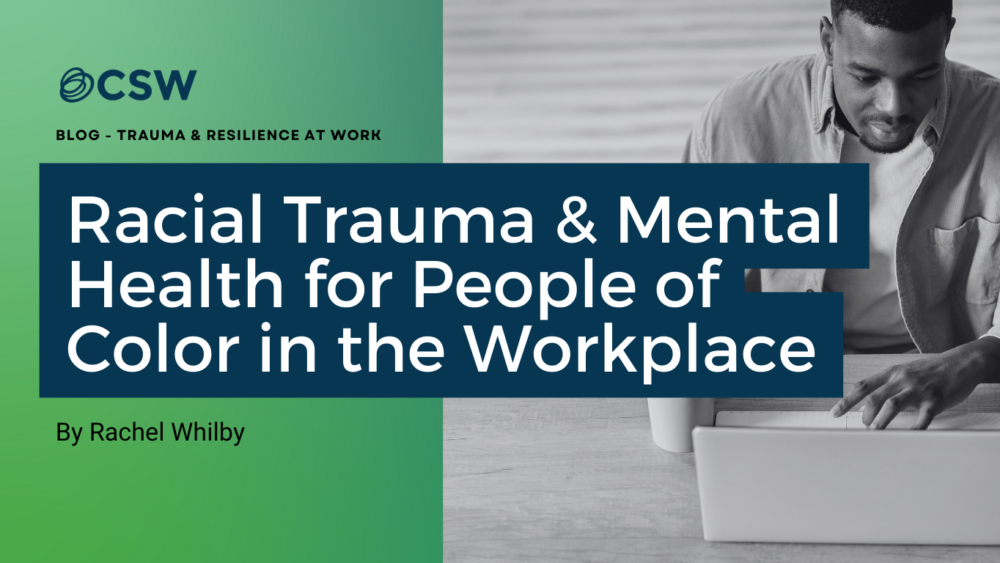Scrolling through Instagram recently, I came across a reel that was both triggering and validating for me as a Black woman. The creator of the reel was also a Black woman, sharing the experience of losing her job when she “stopped looking happy” in the office. I was immediately taken back in time to my own career as a school administrator in August of 2019.
One day, my supervisor called me into her office. I was being reprimanded, but it wasn’t for my performance, attendance, or any pattern of unprofessional behavior. It was because the day before I “wasn’t smiling enough” and it was “perceived by my teammates that I was angry, which ruined their day.” While I reiterated—multiple times—that I was never upset, I was told “her perception was more important than my reality” and “my attitude would not be tolerated.”
Behind the scenes, a slew of personal problems had been bubbling and I was, in fact, depressed. I had been becoming increasingly irritable and easily frustrated. I struggled to stay focused and motivated, and found decision making nearly impossible. However, instead of approaching me with empathy and concern when I was having a difficult time, my former supervisor and teammates stereotypically viewed my behavior as that of “an angry Black woman.”
It became impossible to do my job with some teammates behaving passive aggressively. From avoiding asking me to help with tasks because they found me “unapproachable,” to intentionally scheduling meetings and events at times I wasn’t available to attend, going to work became an increasingly anxiety-provoking experience. This behavior was the opposite of trauma-informed and demonstrated clear hidden racial bias. My supervisor and certain colleagues’ reactions added racial trauma to the mental health struggles I was already experiencing.
POC and Mental Health
My personal challenges, and my former supervisor’s inappropriate mishandling of my situation, ignited in me a passion for shining a light on mental health in the workplace, particularly for people of color. For generations, mental illness has been a taboo topic. For many, mental illness is acknowledged as a legitimate and serious personal issue, but not appropriate for public discussion. Too often, others have minimized conditions—such as depression—as “routine sadness” and consider it a matter of mental fortitude, judging those who suffer as possessing a “character flaw” which they are responsible for managing.
However, according to the National Institute of Health, “depression is the single most common mental disorder in the United States.” It is also well-documented that mental illness contributes to, and may worsen the prognosis of, many other chronic medical conditions such as diabetes, angina, asthma, and arthritis and contributes to physical “weathering”, the erosion of the body over time specifically for people of color. Racism exacerbates mental and physical health conditions and the additionally harmful intersection of the two in several ways. One Blue Cross Blue Shield study found that “major depression goes undiagnosed and untreated at disproportionately greater rates in majority Black and Hispanic communities, leading to unnecessary suffering.”
This disparity is due in part to the atypical presentation of symptoms exhibited by some individuals. There is an increased likelihood that depression will remain undiagnosed for people of color since the current body of research on the variations of depression symptoms have been predominantly conducted in White people. However, a Canadian study found that African Americans are far more likely to exhibit “psychosomatic symptoms”, physical symptoms that accompany psychological state, such as fatigue and insomnia, or self-critical symptoms including self-hate and self-blame. In addition, an NYU study also found that “Black women with symptoms of depression more often report … self-criticism and irritability than stereotypical symptoms such as depressed mood.”
Rooted in systemic racism and other systems of oppression, the ways in which mental health concerns are identified, named, and ultimately treated remains disparate for African Americans and other BIPOC populations as compared to their White counterparts. Racism in healthcare results in people of color receiving less and lower quality healthcare–both mental and physical healthcare.
The Role of Community in Mental Health
Racism is a public health crisis for all. The impacts of racism and other adverse racial experiences are not restricted to people of color. Racism harms the mental and physical health of POC and White people both, as it breaks down trust, relationships, and communities. This results in toxic stress for everyone living in the racist community.
This is why I was thrilled to work with CSW’s Trauma and Resilience at Work team recently to develop a training curriculum on Racial Trauma, Healing, and Resilience. We delivered this training to the Detroit at Work public workforce development system this spring and received very positive feedback on the content’s usefulness. It was also cathartic for me, helping fulfill my passion of raising awareness on the realities of mental health and trauma for people of color.
While there are important steps individuals can take to improve their mental health and exercise self-care, there is also an important responsibility for the communities to which we belong. This includes our workplaces. The 25 Percent Project identifies the ongoing need for collective care, which they define as “when people in a group take care of the wellbeing of others.” Collective care is one of the many practices organizations can take within their workplaces to improve the mental health of all. They recommend the following as best practices in collective self-care:
- Be aware of any sensitive issues or subjects that may need a trigger warning
- Be aware of any major issues happening in the personal lives of your colleagues that may require their attention or may impact their lives or work
- Respect when colleagues tell you they need to be offline
- Learn to say no and empower others to flag unreasonable expectations and timelines
- Communicate clearly about any unresolved issues with an individual team member
- Limit channels of communication for work; do not use FB chats and Whatsapp for ongoing work conversations
- Spend 10 minutes at the beginning of a call catching up on life and personal updates with the team member you are speaking to
Racial trauma negatively impacts both mental and physical health if left unacknowledged in a community or organization. However, we can all build resilience and heal through self-care and collective-care strategies. It is important to recognize that self-care alone is not a remedy for systemic issues; healing happens in community and well-being is a shared responsibility. We build resilience to strengthen ourselves, our communities, and our workplaces.
Meet the Author
Rachel Whilby
As a Research Associate at CSW, Rachel brings key competencies in research and evaluation, data collection, data analysis, competency groups and writing. She is a part of the Workforce Benchmarking Network and supports CSW’s data work across other teams as well. Continue Reading >>




Comments are closed.